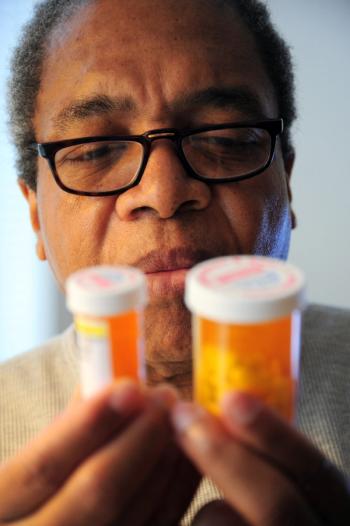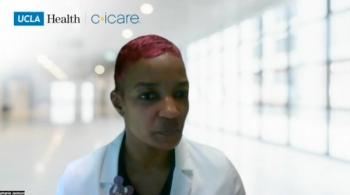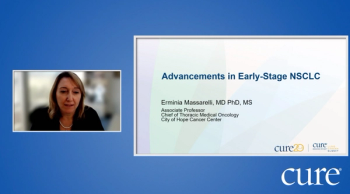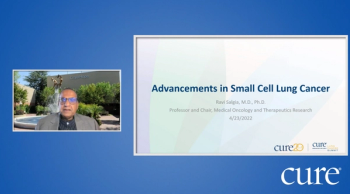
The use of five or more medicines — as well as some drugs that could be deemed inappropriate — may put older patients with cancer at a higher risk for complications, such as weakness.

Brielle Benyon, Assistant Managing Editor for CURE®, has been with MJH Life Sciences since 2016. She has served as an editor on both CURE and its sister publication, Oncology Nursing News. Brielle is a graduate from The College of New Jersey. Outside of work, she enjoys spending time with family and friends, CrossFit and wishing she had the grace and confidence of her toddler-aged daughter.
Follow Brielle on Twitter @Brielle_Benyon.

The use of five or more medicines — as well as some drugs that could be deemed inappropriate — may put older patients with cancer at a higher risk for complications, such as weakness.

The FDA approved Tabrecta for patients with non-small cell lung cancer who have a mutation that led to MET exon 14 skipping.

Many patients with breast cancer ask about the benefits of the supplement sulforaphane, but a naturopathic doctor advises patients that it is best to get the compound from food rather than supplements.

Fruquintinib improved survival in patients with advanced colorectal cancer, according to findings from the phase 3 FRESCO-2 trial.

Actress/musician Olivia Newton-John has died after a long bout with breast cancer.

The Food and Drug Administration approved oral Nubeqa plus the chemotherapy docetaxel for patients with metastatic hormone-sensitive prostate cancer.

The Food and Drug Administration approved Enhertu for the treatment of unresectable or metastatic HER2-low breast cancer — marking the first targeted drug for this newly defined breast cancer subtype.

From the late YouTuber “Technoblade” being honored by the Sarcoma Foundation of America to a country singer making a leukemia survivor’s dreams come true, here’s what’s happening in the cancer space this week.

The tablet version of Calquence, which was approved by the FDA for the treatment of chronic lymphocytic leukemia, small lymphocytic leukemia and relapsed/refractory mantle cell lymphoma, may be taken alongside other drugs to reduce gastric-related side effects.

In this video, an expert discusses which men with prostate cancer are eligible for genetic testing, and what patients can do if they are not eligible but want to undergo testing anyway.

Cancer-related pain, especially when severe, is associated with negative effects on patients’ employment and financial status, recent findings showed.

Survivors of childhood cancer had higher rates of infection-related hospitalizations than their healthy peers, at both the five- and 10-year post-treatment mark.

Patients with cancer are encouraged to learn more about their disease from evidenced-based sources and not “Dr. Google.”

Subcutaneous (injectable) Tecentriq had similar movement throughout the body, while saving on treatment time compared to intravenous administration of the drug in a group of patients with non-small cell lung cancer.

The FDA will allow the study of CYAD-101, a novel CAR-T cell therapy, to continue in patients with metastatic colorectal cancer now that the eligibility criteria for the trial has been amended.

Shrinking liver cancer tumors helps patients become eligible for transplant, thus improving their long-term outcomes, according to recent study results.

TAVT-45, an easy-to-swallow drug that can be suspended in water or juice, is being studied for the treatment of patients with metastatic prostate cancer.

In honor of World Lung Cancer Day, CURE® compiled the five most-read lung cancer-related news items from 2022 that patients may have missed.

Findings from the CheckMate-914 trial showed that Opdivo plus Yervoy did not meet the study’s main goal of disease-free survival for patients with localized renal cell carcinoma, a type of kidney cancer.

From actors Tony Dow and David Warner dying from cancer to a cancer survivor rappelling a building in the name of awareness and fundraising, here’s what’s happening in the oncology space this week.

Although some advancements to boost minority and female enrollment onto cancer clinical trials have occurred since the passing of a law 20 years ago, those improvements have begun to level off, according to an expert.

A new treatment group within the PYNNACLE clinical trial is set to evaluate a novel drug plus Keytruda in patients with p53 Y220C-mutant locally advanced or metastatic solid tumors.

More than half of patients with metastatic, cisplatin-ineligible bladder cancer saw their cancer shrink when given Padcev and Keytruda in a clinical trial.

Watch Dr. Erminia Massarelli, from City of Hope, discuss advancements in early-stage non-small cell lung cancer during the CURE Educated Patient Lung Cancer Summit.

Hormone-replacement therapy did not increase chances of death in patients with breast cancer, but certain patient groups may have a higher chance of recurrence from the treatment.

Watch Dr. Ravi Salgia, from City of Hope, discuss advancements in small cell lung cancer during the CURE Educated Patient Lung Cancer Summit.

An ongoing clinical trial aims to determine if pre- and post-surgical chemotherapy can improve outcomes for patients with stage 2 and 3 gallbladder cancer.

If approved, Enhertu may “redefine how we classify and treat metastatic breast cancer,” according to a representative from the drug’s manufacturer.

From Dick Vitale receiving the Jimmy V Award at the 2022 ESPYs to a former triathlon champion opening up about his cancer experience, here’s what’s happening in the cancer space this week.

Findings from previous studies have shown that patients with blood cancers have been less likely to produce antibodies that protect them against COVID-19 after vaccination, but new research indicates that the booster shot may help.